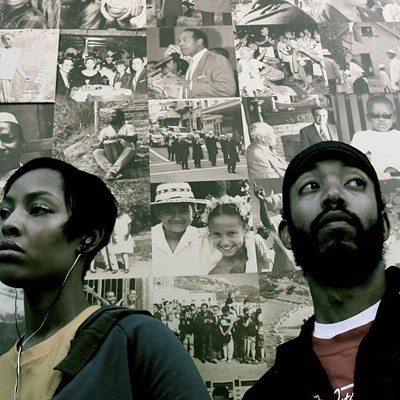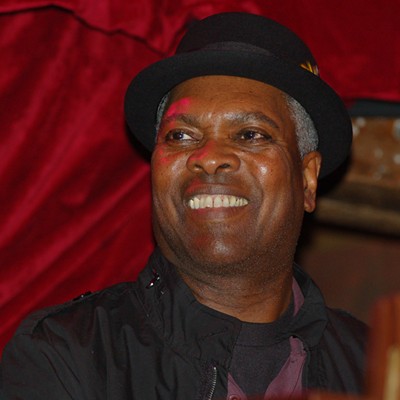Logically, then, with that background, the next thing to do was become a busker in Beantown, right? Armed merely with an acoustic guitar, some high-school talent show songs and a trust fund, Garrett Dutton tried to make it in the music business by leaving home for Cambridge's Harvard Square, where he became a sidewalk musician who gladly accepted the pocket change of his privileged peers. He was just 19 years old. He wasn't, believe it or don't, on drugs.
The man now known as G. Love (a mildly cloying handle that still has some cachet) has since secured his place in the wide pantheon of white appropriators of the musical innovations of black people. From the opening riff of the first track (an update of Guitar Slim's "Things That I Used to Do") on his debut record (G. Love and Special Sauce), it's clear that G. Love's influences are not so much worn on his sleeve as tattooed on his arm.
Obsessed with early blues artists like Mississippi John Hurt and Fred McDowell, Love was determined to pay tribute through his own music to his forebears, be they blues masters or hip-hop savants, like his averred faves Run-DMC. That, or he merely figured out another clever way in which to capitalize on black culture, just like Elvis and the Stones and Beck before him.
Coincidentally, Beck, who beat G. out of the gate with his own folk-hop groundbreaker Loser, often cites the same influences ... whadya know?
This is not to say that G. and his band Special Sauce are not distinctive. From G's mushmouth scat style of sing-rapping he's dubbed "ragmop" to the silky smooth and fluid pre-bop jazz bass lines of Jimmy "Jazz" (natch) Prescott and the sparsely effective rimshot-laden rhythms of Jeffrey "Houseman" Clemens, G. Love and Special Sauce have pioneered a niche that by now is as familiar as the smell of gym socks to a basketball player.
Through five albums, including April release The Electric Mile, the combo has adroitly blended an earthy array of eclectic styles--the aforementioned blues and hip-hop, but also chorus-laden Stax/Volt-era soul and R&B, and a folky emphasis on social consciousness. But when it debuted in 1994, the radio was not saturated with the likes of Everlast, Sugar Ray or Sublime, all of whom have had mainstream success in part by following in G. Love's sonic footsteps as if they were a road map to Shangri-La.
In the face of this anemic radio support, it did what any respect-worthy hardworking band would do--toured and toured and toured. And then it toured. It has paid off, both in the evolution of Special Sauce's music, and in the building of a fan base the grassroots way.
Still, what business does a private-school white boy have aping neglected blues artists like Blind Lemon Jefferson for the edification of a largely white, mostly middle-class audience of college kids? Worse yet, why is it that a significant portion of G. Love and Special Sauce's following consists of that most annoying class of music fan: tape-tradin', patchouli-wearin', Phish-worshippin', Jerry's death-lamentin' hair farmers, whose only distinguishing characteristic is their remarkable vapidity?
On paper, it can all seem like blasphemy, a cultural fraud perpetrated on gullible suburban know-nothings at the expense of the real progenitors of all the music from which G. Love borrows. In some ways, especially earlier in his career, it was valid to say G. Love was merely engaging in a barely concealed form of minstrelsy, especially on the first record where his patois was, charitably speaking, overdone.
But like the Beastie Boys, who early on were derided by black rappers as obnoxious punks who were "stealing the soul" before they demonstrated their chops, G. Love has demonstrated authenticity in his music, which derives from his strong affection for his influences, an expansive knowledge of the musical idioms he purveys, and a work ethic characterized by a willingness to charm audiences and play his heart out under any circumstances. This, of course, he ripped off from James Brown.
In all seriousness, what makes G. Love worthwhile is, more than anything, the fact that he's able to mine all these sources in a way that pays tribute rather than rips off. In fact, he's done a couple of straight-up influence-tribute songs, "Blues Music" on the first record (OK, so it's a name-dropping kind of song, but you rarely hear people like Bukka White get their propers anywhere else), and a hip-hop tribute on 1999's Philadelphonic, which is also the name of G.'s artist development label.
Much like the hip-hop innovation of sampling itself, G. Love and Special Sauce uses a kind of broader cultural sampling, exhibiting the essence of postmodernism. But that aside, the real reason G. Love and Special Sauce doesn't suck is that it strikes the perfect balance between reverence for the past and innovation, between retro and modern, between homage and rip-off.
Oh, and it's a great live band, thanks to J.B.










